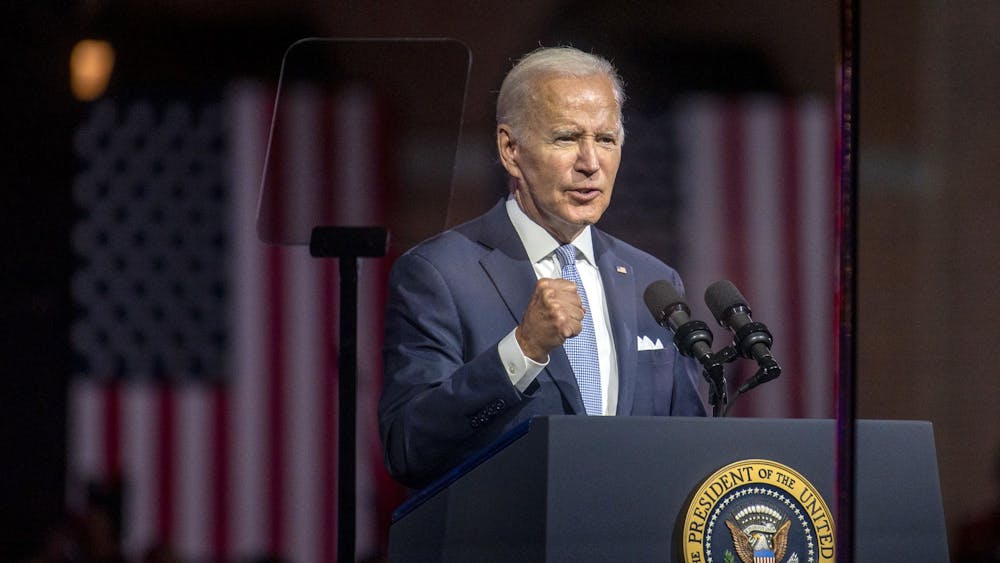Regardless of the outcome in today’s elections, there will be a first in Washington next January.
Either the first black man will be president or the first woman will be vice president, capping what might be the most ground-breaking election in America’s history.
But these firsts don’t come without risks and challenges for each candidate’s constituents.
While it will take a long time to know how race and gender affected the elections, once the results are tallied tonight – or Wednesday morning – at least one group will be left searching for answers.
President Obama would ‘shake the world’
IU-Purdue University Indianapolis political science professor Brian Vargus said race was downplayed during the election for a host of reasons. He said polls indicate about 5 percent to 15 percent of voters are likely to make their decision based on race.
He said a lot of the people who would not vote for Obama because he is black, but there are many people who will vote for him based on race.
Vargus said there would not be a good indicator of what role race played until well after the election, when surveys and research polls ask people about how they voted.
Even this presents a problem, said IU political science professor Marjorie Hershey.
“The biggest challenge for a lot of us is trying to figure out how much of a role racial stereotyping and racial prejudice is playing in a campaign,” she said. “It’s difficult to measure. It’s not something most people feel comfortable talking about in polls.”
Another problem, Hershey said, is voters might not even be aware how race affects their decision.
For some Obama supporters, his candidacy is a tremendous milestone for civil rights, but his presidency would be one of the greatest.
“It would shake the world, and it would be a triumph for freedom,” said Carolyn Calloway-Thomas, a professor of Afro-American Studies at IU.
For Calloway-Thomas, a President Obama would rank alongside Lincoln’s 1863 Emancipation Proclamation, the Brown v. Board of Education ruling and the 1963 march on Washington.
“It has to be one of those moments,” Calloway-Thomas said. “It would shake the world because it would be so symbolic and salient and say so much about the beauty of humankind.”
IU professor Ted Carmines, who teaches a class on the 2008 elections, said President Obama would be an important symbol.
“That doesn’t mean that all of the racial differences will have suddenly disappeared,” Carmines said. “African-Americans are still and will continue to be poorer, less healthy, less educated, less advantaged in almost every way than the majority of the white population, but symbolically it will be very important, there’s no doubt about that.”
While the presidential race looks like it will be close, Hershey said Democrats will increase their majorities in the House and the Senate, which could also indicate something about racial influences.
“That suggests that there are different dynamics going on, and the different dynamic is that we have an African-American candidate,” Hershey said. “The likelihood is that if Senator Obama were not black, his vote totals would be substantially higher.”
The Sarah Palin effect
Zero times two is still zero.
That’s how Hershey quantifies the Sarah Palin effect.
Hershey said vice presidents have almost no impact on how people will vote. She acknowledged that Palin is a polarizing figure in the election but said people vote for the top of the ticket, not the bottom.
The most any vice-presidential nominee has influenced a race was half a percentage point, Hershey said. So if Palin makes twice as much difference as any other running mate has, that’s still just 1 percent.
Palin and former Democratic presidential nominee Hillary Clinton made gender a key role in this election as two of the most serious female candidates for the executive office since Democrat Geraldine Ferraro ran as a Democratic vice-presidential nominee in 1984.
But for Carmines, Palin and Clinton represent opposing forces.
“They’re two different embodiments of the women’s movement,” he said.
Carmines said Clinton represents the modern and cutting-edge women’s movement, and Palin represents the social conservative’s reaction to that.
This affects how a Palin victory will change the women’s movement, he said.
“She’s so antithetical to the women’s movement, so I don’t think there would be much impact there,” he said. “It’s almost like Clarence Thomas. ... He was not seen as this champion of African-Americans, and I don’t think she’s going to be seen as a champion of women.”
This is one reason why gender is less of an issue than race. Another, Vargus said, is that women moved into higher positions in the government.
For instance, while there have been 35 women senators, there have only been five black senators. Currently, House Speaker Nancy Pelosi is third in line to take the presidency.
These indicate that – at least for the time being – women have achieved more in political advances than blacks.
But that doesn’t mean work is over for the women’s movement.
IU College Republican chairwoman Chelsea Kane said she is excited to see if Palin becomes the first female vice president.
“It would be really exciting,” Kane said, “because it shows that women in the Republican party are not exceptions and not discounted from being viable leaders.”
From here?
Whichever first is realized, there will be many unanswered questions Wednesday, some of which include the effect gender and race had on the election.
More than likely, both women and blacks will reevaluate their place – for better or worse – in American politics.
If Obama loses, race relations will once again move under the public microscope.
“If he does not win, it would create a sensitivity about who we are as a people, and it would also invite a serious discussion of civil rights and the meaning of race in America,” Calloway-Thomas said.
Kane said if Palin were to be the first woman vice president, she would be a role model for conservative women across the country.
“You can see a little bit of yourself in her,” Kane said.
Kane said she hopes voters make their minds based on who’s best for the country, despite the importance race and gender have played in the elections.
“That is a difference,” she said, “but I don’t think those are distinctions that make a candidate any more or less worthy.”
Race, gender play important roles
Get stories like this in your inbox
Subscribe





